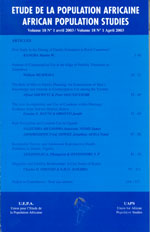
|
African Population Studies
Union for African Population Studies
ISSN: 0850-5780
Vol. 18, No. 2, 2003, pp. 27-45
|
 Bioline Code: ep03009
Bioline Code: ep03009
Full paper language: English
Document type: Research Article
Document available free of charge
|
|
|
African Population Studies, Vol. 18, No. 2, 2003, pp. 27-45
| fr |
Wusu, Onipede & Isiugo-Abanihe, Uche C.
Résumé
Cet article examine la structure de la famille Ogu et son influence sur la prise de décision en matière de santé de la reproduction. Les données utilisées sont des données qualitatives obtenues à partir de 9 "Focus Group" organisés entre hommes et femmes mariées du milieu d'étude. Les données montrent que la structure de la famille dans ce milieu d'étude évolue bien que le type dominant reste la famille élargie. Les résultats de l'étude montrent que des transformations internes tendant à promouvoir l'égalité entre les genres en matière de prise de décision concernant la santé de la reproduction entre époux et épouses sont entrain de s'opérer. Ces évolutions peuvent être dues par l'influence croissante de la culture occidentale et la généralisation de l'éducation dans la population étudiée qui accompagnent nécessairement les transformations économiques, politiques et culturelles en cours dans la société.
|
| |
| en |
Family Structure and Reproductive Health Decision-Making Among the Ogu of Southwestern Nigeria: A Qualitative Study
Wusu, Onipede & Isiugo-Abanihe, Uche C.
Abstract
This study examines the structure of the Ogu family and its influence on reproductive health decision-making using a qualitative approach. Data were sourced through nine focus groups organized in the study area among married men and women. The data reveal that the family structure in the study area is changing, although the dominant pattern remains extended. The findings of the study suggest that there are on-going internal transformations that tend to enhance gender equity in reproductive health decision-making between husbands and wives. These changes may be attributed to the widespread influence of western culture and the spread of education in the study population, which are necessary concomitants of economic, political and cultural changes taking place in the society.
|
| |
© Copyright 2003 - Union for African Population Studies
Alternative site location: http://www.uaps-uepa.org
|
|
